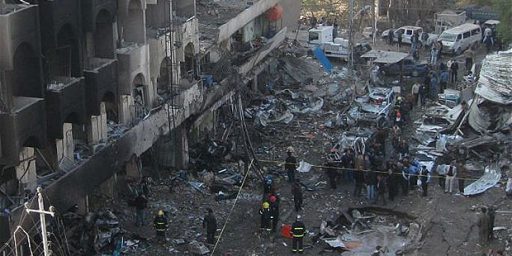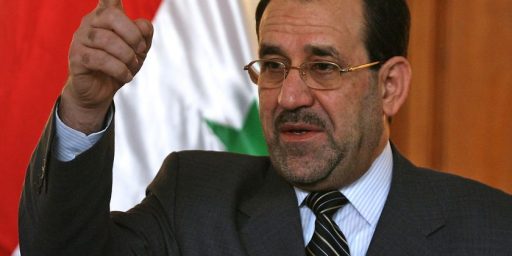Iraqis Say Better Off Than Before War
A survey of Iraqi public opinion finds them surprisingly upbeat after four years of war. London based Opinion Research Business (ORB) conducted and self-funded the survey, which has been reported in the Times here and here. A press release, raw data, charts, and tables available here.
A team of 400 interviewers conducted face-to-face interviews. The findings are both awful and encouraging:
- Some 26% of Iraqis – 15% of Sunnis and 34% of Shi’ites – have suffered the murder of a family member. Kidnapping has also played a terrifying role: 14% have had a relative, friend or colleague abducted, rising to 33% in Baghdad.
- Only 27% think there is a civil war in Iraq, compared with 61% who do not. 41% of Sunnis believing Iraq was in a civil war, compared with only 15% of Shi’ites.
- By a majority of two to one, Iraqis believe military operations now under way will disarm all militias. More than half say security will improve after a withdrawal of multinational forces.
- 49% of those questioned preferred life under Nouri al-Maliki, the prime minister, to living under Saddam. Only 26% said things had been better in Saddam’s era, while 16% said the two leaders were as bad as each other and the rest did not know or refused to answer. Sunnis were more likely to back the previous Ba’athist regime (51%) while the Shi’ites (66%) preferred the Maliki government.
- The poll suggests a significant increase in support for Maliki. A survey conducted by ORB in September last year found that only 29% of Iraqis had a favourable opinion of the prime minister.
Some interesting anecdotal evidence as well:
This weekend comments from Baghdad residents reflected the poll’s findings. Many said they were starting to feel more secure on the streets, although horrific bombings have continued. “The Americans have checkpoints and the most important thing is they don’t ask for ID, whether you are Sunni or Shi’ite,” said one resident. “There are no more fake checkpoints so you don’t need to be scared.”
The inhabitants of a northern Baghdad district were heartened to see on the concrete blocks protecting an Iraqi army checkpoint the lettering: “Down, down with the militias, we are fighting for the sake of Iraq.” It would have been unthinkable just a few weeks ago. Residents said they noted that armed militias were off the streets.
One question showed the sharp divide in attitudes towards the continued presence of foreign troops in Iraq. Some 53% of Iraqis nationwide agree that the security situation will improve in the weeks after a withdrawal by international forces, while only 26% think it will get worse.
“We’ve been polling in Iraq since 2005 and the finding that most surprised us was how many Iraqis expressed support for the present government,” said Johnny Heald, managing director of ORB. “Given the level of violence in Iraq, it shows an unexpected level of optimism.”
Despite the sectarian divide, 64% of Iraqis still want to see a united Iraq under a central national government.
This, however, isn’t so good:
One statistic that bodes ill for Iraq’s future is the number who have fled the country, many of them middle-class professionals. Baghdad has been hard hit by the brain drain — 35% said a family member had left the country.
 Looking at the charts, something else jumped out at me: 59% of those surveyed were not employed. All surveyed were over 18 (by design) and only 10% were over 55. Precisely half surveyed were women, though, which may mitigate the figure somewhat.
Looking at the charts, something else jumped out at me: 59% of those surveyed were not employed. All surveyed were over 18 (by design) and only 10% were over 55. Precisely half surveyed were women, though, which may mitigate the figure somewhat.
As I’ve noted before, surveys conducted in countries without a history of freedom and security are suspect. These people are likely to be afraid to speak their mind, distrustful of outsiders, and culturally prone to tell people, especially strangers, what they think they want to hear. On the other hand, ORB has conducted previous surveys in Iraq and the trends are positive even from that baseline.
Taking the results at face value, though, it’s remarkable that people would feel they’re better off now than under Saddam considering the awful personal price most have paid. Then again, the majority Shi’ites are undoubtedly better off in many ways and they surely have more cause for optimism about the long term.
As to the “civil war” debate, it’s largely academic. The situation on the ground is what it is, regardless of how one labels it. My training tells me that a disparate collection of anti-government forces conducting guerrilla and terrorist attacks without a common political objective does not meet the definition of “civil war.” That doesn’t make the daily slaughter less significant.
UPDATE: Richard Fernandez‘ analysis of what this all means strikes me as quite plausible: “What the poll amounts to is a snapshot of what the Iraqi public thinks the trajectory should be. It implies that they desire a post-Saddam world free of certain influences which they are now struggling against; that the US has a role in helping them reach that state after which they devoutly wish it would leave.”
Cernig is right, too, that since only 49% say they prefer Maliki, one can’t positively say a majority think things are better. Still, only 26% — and only a bare minority of 51% of the Sunnis — say life was better under Saddam.
Given that the survey is taking place in the context of daily terrorist attacks and that 26% of respondents have lost a family member is this violence, I’d say the numbers are remarkable. Indeed, even as someone who has supported the war, I wouldn’t say the Iraqis are better off now; my hope is that, after the fighting stops, Iraqis will have a future far brighter than it could have been under the rule of the Hussein dynasty.
See Memeorandum for more blogger reactions.






That I didn’t notice, One point that I didn’t notice mentioned in your article, was that the vast majority of Iraqis do not believe they are broiled in a civil war.
As my friend David says, it seems reasonable they’re not getting their news from CNN. As to the number of Iraqis who have up and left the country, it seems reasonable to assume that a goodly majority of these, were Baathists, which the country is better off without.
It’s worth mentioning that, according to the poll, a narrow majority of Iraqis believes that things would get better if the MNF were to leave immediately. When this particular finding is examined a little more closely, the figures are somewhat skewed by the believe of large numbers of Shi’a Iraqis that things would get better if the MNF were to withdraw. This makes me wonder what the operative definition of “get better” is. A freer hand to ethnically cleanse Baghdad, perhaps?
This makes me wonder what the operative definition of “get better†is. A freer hand to ethnically cleanse Baghdad, perhaps?
Quite possibly.
Indeed, subjective views are going to be skewed by competing interests in a multi-ethnic state. Interestingly, though, there seems to be a strong consensus that a unified state is desirable.
It makes sense that the Shiites would want a unified state; they can control it. I couldn’t find the detail on what percentage of Sunnis, who will get the short end of the stick and accordingly drive much of the insurgency, favor the same.
The captain notes that a majority of Sunnis prefer a centralized state. Interesting…..